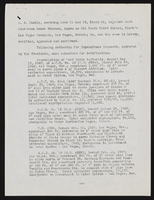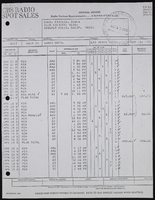Search the Special Collections and Archives Portal
Search Results
Patricia Ann Ross oral history interview
Identifier
Abstract
Oral history interview with Patricia Ann Ross conducted by Judy Harrell on March 19, 2014 for the West Charleston Neighborhoods--an Oral History Project of Ward 1. Ross discusses mob-dominated gambling, Mormonism, the Helldorado Rodeo, medical advances, and Clark County School District’s Sixth Grade Centers within Las Vegas, Nevada.
Archival Collection

Jean Sherman McColl interview, March 1, 1977: transcript
Date
Description
On March 1, 1977, collector Sam C. Melchiome Jr. interviewed Jean McColl (born May 24th, 1931 in California) at her home in Las Vegas, Nevada. In this interview, Jean McColl discusses growing up in Searchlight and then Las Vegas, Nevada. She discusses how her family came here as well as the many changes she has seen through the decades living in Las Vegas, Nevada.
Text

Photograph of the dedication of Tom Williams Park, North Las Vegas, April, 1967
Date
Archival Collection
Description
The dedication of Tom Williams Park in North Las Vegas, Nevada. (L-R) Rev. Aubrey Walley, Methodist Church, Hal Fincher, North Las Vegas Parks and Recreation Board, Dorothy Booth; Councilman Jack Petitti; Theron Goynes, North Las Vegas Parks and Recreation Board; Father James Shehy, the Catholic priest who gave the prayer.
Image
Bruner, Elmo C., 1906-1973
Elmo C. Bruner came to Las Vegas, Nevada in 1947 and established himself as an architect and appraiser. Born in Texas, he grew up in Oklahoma and attended Oklahoma State University. He graduated in 1931 with a BA and BS in architecture and engineering. He married Lucile Spire that same year. The couple went on to have four children: Elmo, Allen, Jerry, and Janice. After graduation, he worked for the Oklahoma State Highway Department and for several oil companies. From 1945 to 1947, he worked as an architectural engineer on the Los Alamos Project.
Person

Transcript of interview with Pamela Hicks by Elaine Broniecki, February 16, 1979
Date
Archival Collection
Description
On February 16, 1979, collector Elaine Broniecki, interviewed local Clark County School District teacher, Pamela Calos Hicks, (born in Dayton, Ohio, on November 23rd, 1946) in her home in Las Vegas, Nevada. This interview covers Hicks’ recollections of Las Vegas from 1955 to 1979. Hicks’ also lists the addresses of where she has lived within Las Vegas.
Text
Vegas PBS Interviews for the African Americans in Las Vegas: a Collaborative Oral History Project
Identifier
Abstract
Oral history interviews with Ruby Amie Pilot, Eva G. Simmons, Melvin Sanders, Jarmilla McMillan-Arnold, Hannah Brown, Sonny Thomas, and Claytee White conducted by Vegas PBS on April 01, 2013, April 02, 2013, April 12, 2013, and November 19, 2013 for the African Americans in Las Vegas: a Collaborative Oral History Project. In these interviews, the participants discuss their early lives and moving to Las Vegas, Nevada. Pilot talks about segregation on the Las Vegas Strip, integration, and the importance of church activities in the African American community. Simmons describes her career as a teacher, the schools on the Westside, and businesses on Jackson Street. Thomas describes the funeral industry and his role as a funeral director. McMillan-Arnold talks about segregated Las Vegas, African American entertainers, and the issue of homelessness on the Westside. Brown remembers growing up on the Westside, segregated schools, and her role as President of the National Coalition of 100 Black Women – Las Vegas chapter. Lastly, Sanders discusses his childhood in Las Vegas, being the son of a preacher, and the redevelopment of the Westside.
Archival Collection
Ida Pinckney oral history interviews
Identifier
Abstract
Oral history interviews with Ida Pinckney conducted by Claytee D. White on August 23, 2012 and November 05, 2012 for the African Americans in Las Vegas: a Collaborative Oral History Project. In this interview, Pinckney discusses her personal history and life in Las Vegas, Nevada after moving there with her family as a child in 1942. She begins by talking about her family and living in a tent house in the Westside community of Las Vegas. Pinckney describes how she feels Westside development has been stunted by an overabundance of churches in the area not paying taxes, life in the Westside during the 1940s, and her experiences as an African American woman in Las Vegas. Other topics of discussion include Pinckney being a member of Culinary Workers Union Local 226, her father and brother working at the Nevada Test Site, and various aspects of Las Vegas history. Willie Jean Beatty also participates in the interview, helping Pinckney expand on topics such as the presence of organized crime in casinos and her involvement in the Sisters Network: An Afro-American Breast Cancer Survivors Organization.
Archival Collection
Coleen York Wilson oral history interview
Identifier
Abstract
Oral history interview with Coleen York Wilson conducted by Claytee D. White on June 4, 1996 for the African Americans in Las Vegas: a Collaborative Oral History Project. In this interview, Wilson talks about growing up in Fordyce, Arkansas before moving to Las Vegas, Nevada in 1953 at the age of eighteen. She mentions that her parents had moved to Nevada in 1940 to work at Basic Magnesium, Incorporated (BMI), living in a trailer before returning to Fordyce two years later. She then discusses moving to Las Vegas to join an older sister and relates that she did not remember any discrimination in seating or eating meals during her bus trip. After this, Wilson lists the jobs she held in Las Vegas before her retirement in 1984, including work at the Las Vegas Cleaners, serving as a school crossing guard, and working as a housekeeping supervisor at the Stardust Resort Hotel, the Hacienda Resort Hotel, and Circus Circus Hotel and Casino before taking a job at the Nevada Test Site. She also talks about her family, her church activities, and her regret at not attending college.
Archival Collection


